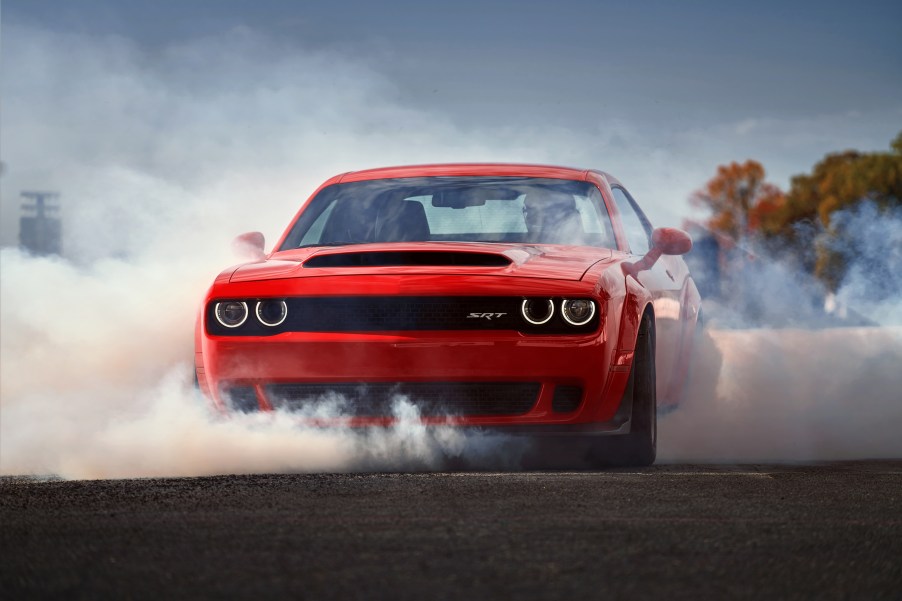
Rumored 909-Hp Dodge Challenger Slays Demon With E85
The Dodge Demon is sacred to SRT. Though the Challenger and Charger Hellcats have grown sharper claws over the years, none have matched the Demon’s output. Even the Challenger SRT Super Stock stops just shy of the Demon’s power level. But according to a new rumor, the Dodge Challenger is about to commit heresy with the help of some E85.
Word on the street is an E85-powered 909-hp Dodge Challenger is in the works

If you need a refresher on the Dodge Demon’s insanity, here are the highlights. Officially named ‘Challenger SRT Demon,’ it’s basically a Challenger Hellcat designed entirely for the dragstrip. And one of the keys to its rule-breaking ¼-mile speed is its drivetrain.
Dodge took a Hellcat 6.2-liter V8 and added a larger supercharger, bigger hood scoop, upgraded fuel system, stronger driveline, and beefier internals. The result was 808 hp on 93-octane gas. And as part of the $1 Demon crate, Dodge included an ECU tune that let this hulking muscle car run on race gas. Pumped full of racing juice, the Demon makes 840 hp—that’s almost 50 more than a Hellcat Redeye.
But even that might not be enough to help the Dodge Demon keep its infernal muscle car crown. According to “an unnamed source close to the project,” Dodge is developing an even stronger Challenger, Road & Track reports. With the help of E85, this Challenger supposedly makes 909 hp.
No, that’s not a typo. If this rumor is accurate, Dodge will soon sell you a Challenger that makes near-four-digit power. Talk about ending on a bang.
Can E85 really help overpower the Demon?

As of this writing, Dodge hasn’t officially commented on this 909-hp Challenger that runs on E85 rumor. But assuming Dodge is working on an ultra-high-power last-hurrah Challenger, is 909 hp really possible on E85? Technically, yes.
Whether you call it E85 or flex-fuel, it’s a blend of 85% ethanol and 15% gasoline, hence the name. Now, ethanol isn’t as great for the environment as some hoped. Also, it’s not as energy-dense as gasoline, so cars running on flex fuel have lower gas mileage. But it’s great for power-hungry tuners, especially ones that work with turbocharged and supercharged engines because it’s a high-octane fuel. While premium gas is usually 93-octane, E85 typically has a 100-105 octane rating. For comparison, most race gas blends have a 100-120 octane rating.
The higher a fuel’s octane, the more it resists knocking, aka ping. That’s vital for making massive horsepower with forced-induction engines because they stress their components heavily. With a higher-octane fuel, a tuner can add boost pressure, make the ignition timing more aggressive, and thus pump up the horsepower. In addition, much like methanol, E85 releases less heat during combustion. As a result, the engine stays cooler, which also helps it make more power.
Now, besides hardware modifications, a car needs an ECU tune to extract the most performance out of E85. But Dodge could totally do this on a factory level; $1 Demon crate, remember? Furthermore, this 909-hp Dodge Challenger wouldn’t be the first high-performance car to run on E85. The Koenigsegg Jesko, for instance, needs E85 to make its maximum 1600 hp.
So, yes, Dodge could theoretically make a Challenger develop 909 hp using E85. As for whether this hyper Dodge Challenger would be a challenger for the Demon, that’s still up in the air.
Can you run your own Dodge Challenger on E85?
Since it’s an anonymous rumor at this point, it’s difficult to say when or if this hypothetical Challenger will break cover. But since Dodge is ending Challenger production after 2024, this rumored E85-powered devil might not stay in the shadows for long. R&T estimates official news by the end of the year.
In the meantime, there are several shops that offer E85 conversion kits for current Dodge Challenger models. eFlexFuel, for example, offers ones for both Hellcat and naturally-aspirated V8 models that start at $700. However, it’s worth noting that these kits aren’t street-legal. And even if you do find one that is, some states might not let you register your tuned Challenger.
Still, that’s one way you can get your own E85-powered Demon slayer.
Follow more updates from MotorBiscuit on our Facebook page.


